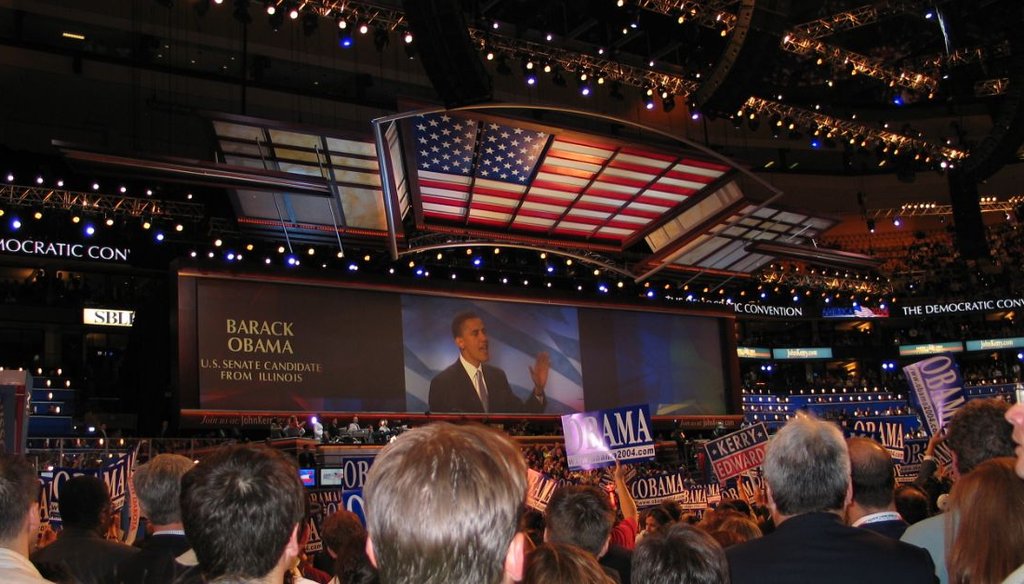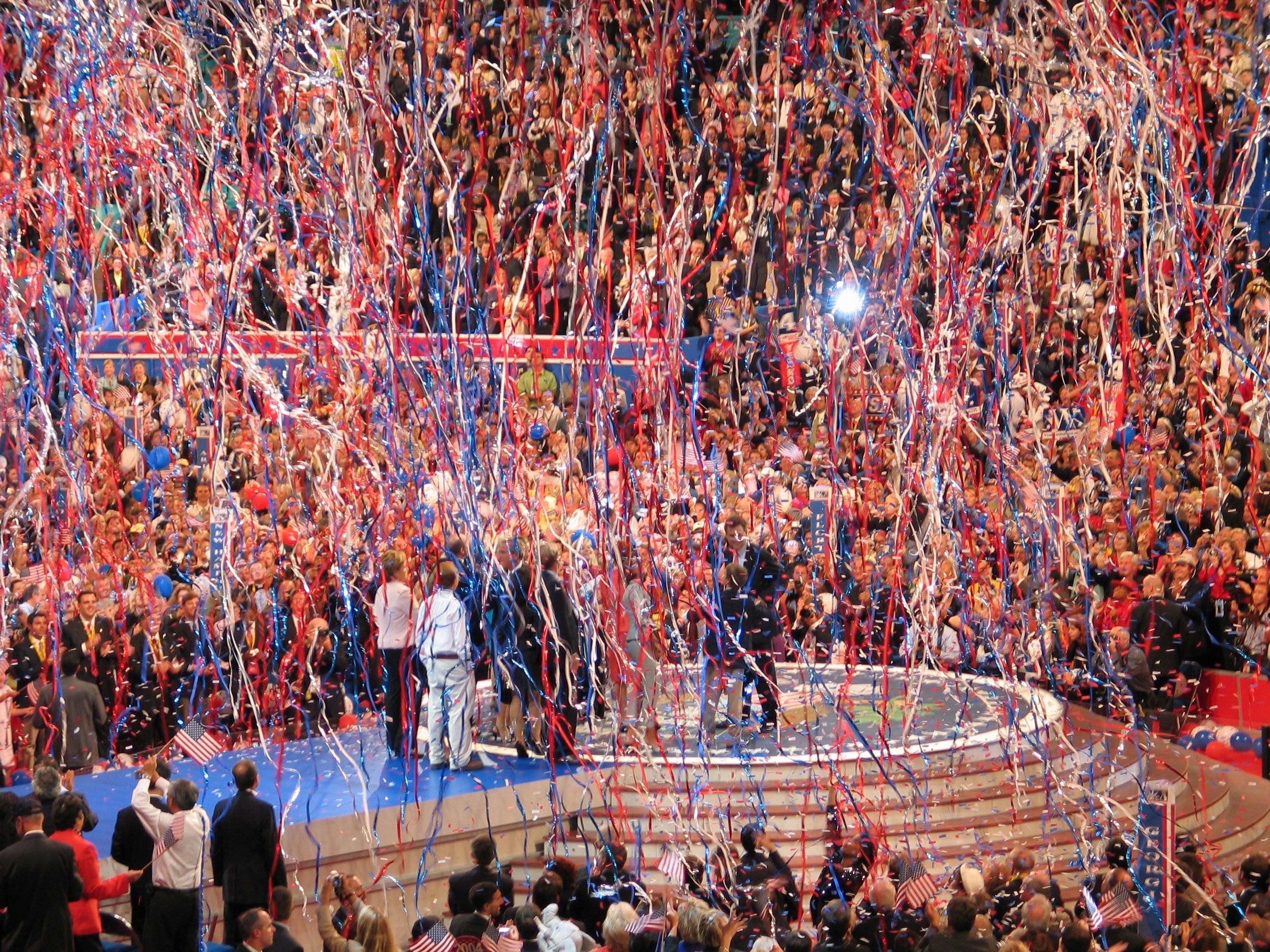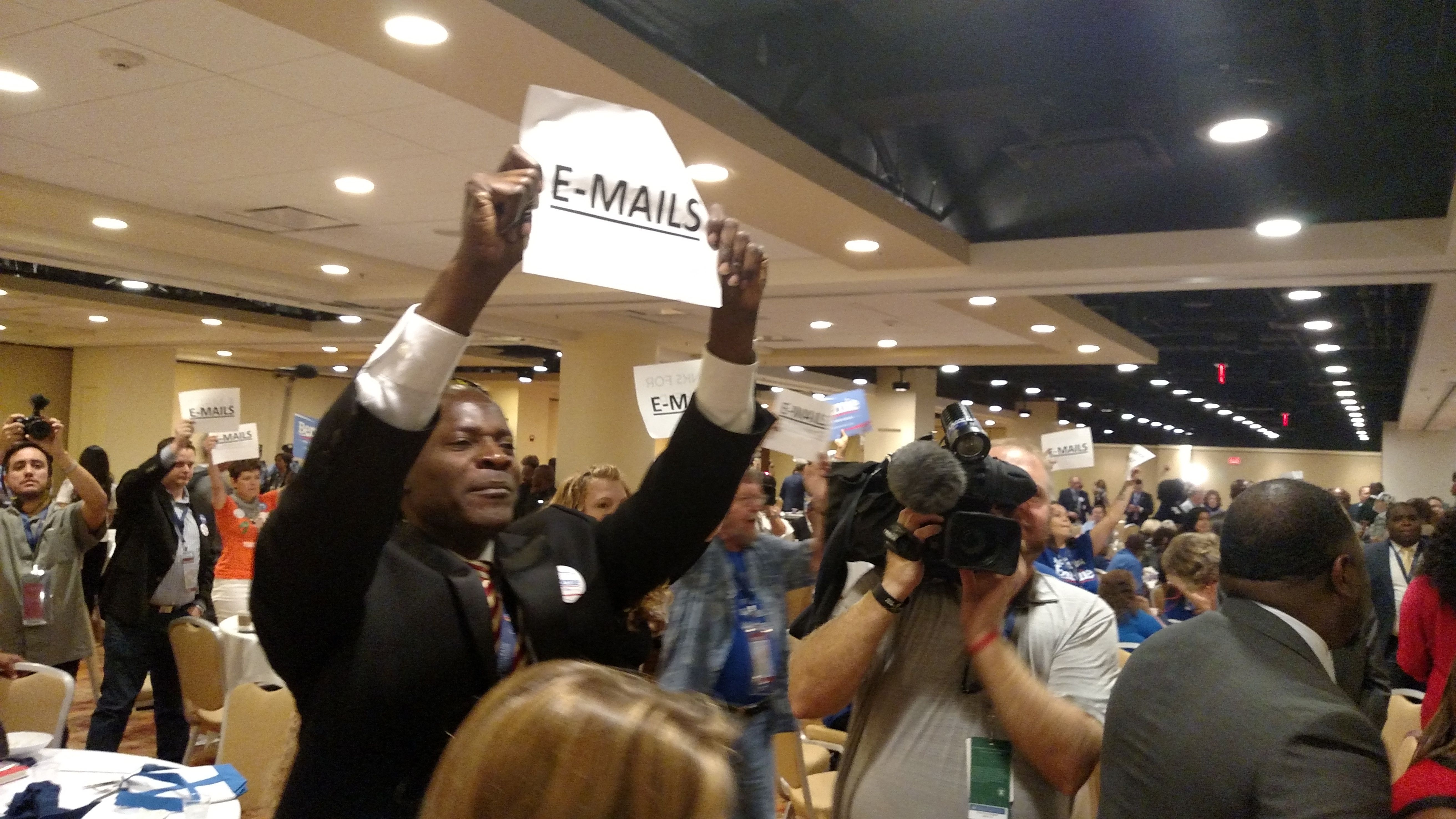Get PolitiFact in your inbox.

Barack Obama, then a little-known Senate candidate, gave a pivotal speech at the 2004 Democratic convention in Boston. (Louis Jacobson)
If Your Time is short
- This year, the party conventions are going virtual due to the coronavirus. That makes veterans of conventions wistful.
- While it's easy to make fun of conventions for everything from delegates' funny hats to the lavish parties thrown by lobbyists, there's value in the in-person interations between candidates, delegates, and the media.
The national party conventions begin this week, the Democrats first, followed by the Republicans next week.
Ordinarily I’d be on an adrenaline rush.
My time covering 13 conventions has reflected both the nation’s changing politics and its changing technology. When I began, I was the intern charged with ferrying film canisters into and out of the convention hall, communicating with my colleagues via walkie-talkie. Now everything is digital, and smartphones are ubiquitous. Articles that once had to be called in from payphones are now loaded into the ether from laptops. Each convention was made a little bit easier by the emergence of such inventions as AirBnB and Uber.
While I’ll still be covering them this year, the coronavirus pandemic has forced both parties to make their conventions virtual. So over the next two weeks, I’ll be watching and writing from my home office — the first time I won’t be covering at least one convention in person since the 1984 election cycle. I have an excuse for that year — I had just finished middle school.
So this week, I’m feeling wistful. For me and other political junkies like me, this year’s conventions just won’t be the same.
Yes, there are reasons to make fun of the conventions: The ridiculous hats worn by delegates. The boring speeches. The lavish parties funded by lobbyists, a barely disguised attempt to shape the political process.
In fact, it’s become a recurring complaint among many in politics that the conventions are too long and don’t deserve the four-day block of coverage they receive on broadcast and cable TV. With only a limited amount of official business to be conducted — basically, the approval of the platform and the official nomination of the presidential and vice presidential candidates — there’s been much discussion of conventions being dinosaurs, a big waste of time and money.
Maybe. But there are also reasons — beyond my own selfish ones — why in-person conventions add value, and why I hope they don’t disappear after this year’s virtual experiment.
George W. Bush and Dick Cheney accepting renomination with their families at the 2004 Republican convention in New York. (Louis Jacobson)
At the 1988 Democratic convention in Atlanta, which was my first, a then-little-known Arkansas governor, Bill Clinton, was given a prime speaking slot. He bombed. Clinton’s speech was so long and uninteresting that the delegates — in other words, the Democratic Party’s most faithful — applauded when he said, "And in conclusion… ."
Yet four years later at the party’s convention in New York City, the camera followed Clinton on his long walk into the convention hall, building drama as he prepared to accept the nomination. During his acceptance speech, Clinton unveiled an almost entirely unknown photograph of himself as a teenager, shaking hands with then-President John F. Kennedy. Clinton, or the people around him, had learned a lot in four years about how to generate excitement. And he went on to win the presidency that fall.
Coming at the end of a strong primary showing as a trailblazing Black candidate, Jesse Jackson delivered a powerful and well-received speech at the 1988 Democratic convention that ended with a repeated call to "Keep hope alive!" At that same convention, Texas state treasurer Ann Richards dismissed George H.W. Bush as "born with a silver foot in his mouth," inspiring waves of laughter in the hall and kick-starting Richards towards a victory in her state’s gubernatorial race two years later. And at the 2004 Republican convention in New York, the city’s former mayor, Rudy Giuliani, memorably wrapped himself and his party in 9/11 rhetoric.
In each case, the audience response was crucial to how the remarks played to the wider world. Sometimes, conventions yield telling moments that are unscripted. During the 2016 Republican convention in Cleveland, Texas Sen. Ted Cruz took the almost unheard-of step of refusing to endorse Donald Trump from the podium. This drew a chorus of raucous boos from delegates that cemented Trump’s centrality with the Republican base.
The ultimate star-making speech came in 2004, when Barack Obama delivered the Democratic keynote in Boston. Obama, at the time a relatively obscure Senate candidate, told the awed crowd, "There is not a liberal America and a conservative America — there is the United States of America." The electricity on the floor was palpable. Four years later, he was elected president.
If there’s an Obama waiting in the wings for the Democrats this year, they’re going to have a hard time following in his footsteps. They’ll have just minutes and will lack a live audience to play off.
Protesters aligned with Bernie Sanders denounce Rep. Debbie Wasserman Schultz at a Florida delegation breakfast at the 2016 Democratic convention in Philadelphia. (Louis Jacobson)
Conventions force reporters to get out of their bubble.
I always tried to do some campaign-trail reporting in the surrounding areas, such as little-noticed congressional races. For all the chaos on the floor, reporters at the 2016 GOP convention universally came away with admiration for the city of Cleveland, a place many of them may not have otherwise visited. Even the souvenir offerings showed a persistent difference between the parties: Democratic gear is always centrally controlled and required to have the union label, while Republican swag always pushed the envelope, in a libertarian, devil-may-care way.
Inside the hall, the interactions with real individuals informed my understanding of the contemporary political culture. For several election cycles in a row, I covered LGBT events at Republican conventions; each time, the events got a little more acceptance by the GOP mainstream. And I remain in touch with delegates I met at conventions more than a decade ago.
Often, the most telling moments aren’t in the convention hall itself, but in the galaxy of events on the periphery of the convention.
I covered the Florida delegation breakfasts in 2016 at both the Republican and Democratic conventions. Both experiences provided me with insights into the political mood, from motivational speeches in Cleveland by the likes of Giuliani and Morris (by then a Republican) to the coordinated protests by Bernie Sanders supporters disrupting the Democratic delegation breakfast in Philadelphia, forcing Rep. Debbie Wasserman Schultz off the podium in the middle of her speech. It was a sign of the continuing tensions within the Democratic ranks that may have contributed to the Democratic ticket’s loss that fall.
We won’t have any such tea leaves to read this year. Maybe in 2024. At least, I hope we do.
Our Sources
PolitiFact, "Party conventions are on for now, but will they be the same?" April 2, 2020










































